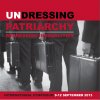The global economic crisis is showing the cracks in the surface of how patriarchy is lived in everyday lives; is now not the right time to refocus the discussion? Can we reclaim ‘patriarchy’ from the analysis of all men as patriarchs? How do we understand masculinities in a more political way? How do we address the ways that patriarchy is bad for men, whilst still recognising the battles for women’s rights? What are the implications of rights language for an understanding of patriarchy? If marriage as an institution is the foundation of patriarchy, why are gay and lesbian movements so into marriage now? What do you get if you undress patriarchy? What does it look like underneath? How can stories, film, art media help us to envision this? If the metaphor is that patriarchy is a prison, who are the prisoners and who are the prison wardens? How do elements of patriarchy replicate themselves in our feminist movements? Patriarchy may be seen as an old-fashioned term with little relevance to current work on gender, yet these kinds of questions motivated participants to get excited about the notion of ‘Undressing Patriarchy’ and inspired them to draft background papers and to travel across the world to take part in this conversation. This was an unlikely encounter of unusual suspects. They spent four days together in a hotel in Brighton, in September 2013, engaged in rather unconventional dialogues across perspectives from feminism, men and masculinities work, sexual rights and other social justice struggles. This publication captures some of the dilemmas, new thinking, the interactive process, analyses, future possibilities and challenges identified in these debates in Brighton.
